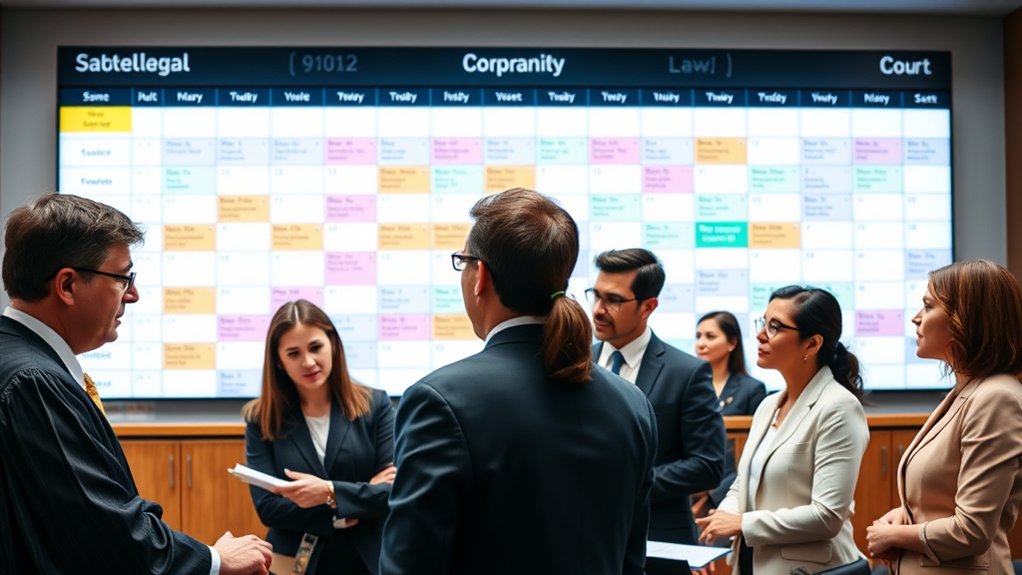Court support services prevent legal delays for companies by enhancing case management and communication. They simplify court processes through navigational support, streamlined documentation, and clear procedural guidelines, which reduces the risk of incomplete submissions that often stall proceedings. By integrating advanced technologies such as e-filing and digital evidence management, these services minimize administrative burdens that contribute to backlogs. In addition, proactive scheduling and early case assessments facilitate timely resolutions, ensuring that companies remain informed and engaged throughout the legal process. By understanding these mechanisms, you can better appreciate their impact on expediting legal matters.
Understanding Legal Delays

Understanding legal delays can feel overwhelming, especially when you realize how many factors contribute to them. Incomplete documentation and inefficient case management can severely hinder progress, leading to increased costs. The discovery process, if not executed efficiently, consumes invaluable time, prolonging court hearings and affecting overall timelines. Additionally, crowded court schedules often result in postponed hearings, complicating access to justice for those involved. Negotiation delays can stall settlements, particularly when parties struggle to reach timely agreements. Furthermore, legal maneuvering tactics, including motions or appeals, can intentionally or unintentionally extend disputes, further impacting operational timelines for companies. Acknowledging these factors is essential for steering through the complexities of legal proceedings and mitigating the risks associated with legal delays.
Importance of Court Support Services
Legal delays can greatly impact businesses, making the role of court support services increasingly important. These services provide essential resources, such as simplified court forms and clear procedural instructions, helping you navigate legal processes efficiently. By accessing up-to-date legal information, you can meet deadlines and avoid procedural setbacks. The presence of navigator agents enhances your understanding of court operations, facilitating better case management. Structured interventions and early case management practices proactively address potential delays, ensuring timely resolutions. Additionally, court support services promote accountability and minimize administrative burdens, markedly contributing to reducing backlogs in legal proceedings. Ultimately, leveraging these services is vital for maintaining operational efficiency and safeguarding your business interests amidst the complexities of the legal landscape.
Streamlining Case Management

As you navigate the complexities of case management, integrating digital evidence management and remote hearing capabilities can greatly enhance efficiency. By adopting efficient documentation practices, you'll not only streamline processes but also reduce the potential for delays that can hinder corporate litigation. Embracing these advancements allows for a more accountable and responsive legal environment, ultimately facilitating swifter resolutions.
Digital Evidence Management
While many courts still rely on traditional methods, adopting digital evidence management systems can revolutionize case management. By considerably reducing the administrative burdens on court clerks, these systems streamline the process, enabling faster case resolutions. With all materials readily accessible, you decrease the likelihood of legal delays caused by missing evidence, which often necessitates rescheduling hearings. Given that 75% of courts don't currently employ digital evidence management, there's a notable opportunity for efficiency gains, as 66% of courts acknowledge the benefits of improved organization. Enhanced access to evidence not only aids judges and attorneys during remote hearings but also contributes to overall case efficiency, ultimately minimizing legal delays and associated costs for companies traversing the court system.
Remote Hearing Integration
Remote hearing integration has transformed how courts manage cases, making it easier for companies to engage in legal proceedings without the hassles of travel. By adopting remote hearings, courts enhance accessibility, allowing you to participate in legal matters promptly. This shift not only reduces legal delays but also helps alleviate the backlog created by traditional in-person hearings. For instance, platforms like Zoom have increased participation rates considerably, evidenced by an 8% rise in Arizona during 2020. Additionally, the incorporation of digital evidence management within remote hearings guarantees timely access to essential materials, effectively mitigating delays linked to evidentiary issues. Overall, remote hearing options afford you the flexibility to address legal matters while minimizing disruptions to your operations.
Efficient Documentation Practices
The shift to remote hearings has laid a solid foundation for improving case management through efficient documentation practices. By employing standardized forms and checklists, you can markedly reduce incomplete submissions that often lead to delays. Organized records facilitate prompt provision of necessary documentation during discovery, streamlining case management and alleviating time-consuming evidence gathering. Additionally, implementing digital evidence management systems enhances access to relevant materials, particularly vital in remote hearings, mitigating evidentiary delays. Regular updates and clear communication with your legal representatives guarantee accuracy and timely submissions, maintaining momentum. Utilizing legal management software automates documentation processes, allowing for quicker responses to court requests and fostering more efficient case preparation overall, ultimately supporting a smoother legal analysis and enhanced operational efficiency.
Enhancing Communication and Collaboration
Enhancing communication and collaboration between court support services and legal representatives is essential for minimizing delays in the judicial process. Effective communication streamlines the exchange of necessary documents, greatly reducing evidentiary delays, a leading cause of court holdups. By adopting collaborative scheduling practices, such as staggered time slots for high-volume lawyers, you can optimize court resources and minimize waiting times for companies embroiled in litigation. Structured support services that facilitate early case assessments enable proactive resolution strategies, addressing potential issues before they escalate into considerable delays. Additionally, implementing feedback mechanisms with local bar associations can enhance rule adherence, improving overall communication and fostering a more efficient court process, ultimately mitigating legal delays for your organization.
Technology's Role in Efficiency

As courts increasingly adopt innovative technologies, efficiency in the judicial process has improved markedly. Implementing digital evidence management systems alleviates administrative burdens, greatly reducing legal delays for companies. E-filing systems enhance case processing, streamlining document submissions and minimizing clerical errors, which translates to faster resolutions. Additionally, AI-driven legal research tools provide quicker access to essential laws and precedents, expediting decision-making and case outcomes. The permanence of remote hearings post-pandemic has also contributed to greater accessibility, effectively reducing wait times for court cases. Importantly, 66% of courts acknowledge the potential benefits of organized digital evidence management in improving judicial efficiency, thereby enabling a more effective legal environment that supports businesses in maneuvering their legal challenges promptly.
Benefits of Remote Hearings
While many traditional court processes can be intimidating, remote hearings have transformed the landscape by making legal proceedings more accessible and efficient. These hearings have become a permanent feature in many court systems, greatly reducing legal delays and expediting case resolutions.
Key benefits include:
- Increased participation rates, as seen in Arizona's 8% rise in 2020.
- Significant reduction in failure-to-appear rates, dropping from 40% to 13% in Maricopa County eviction cases.
- Enhanced safety for vulnerable individuals who can participate without facing intimidating environments.
- Improved overall efficiency through technology integration, alleviating backlogs caused by crowded court calendars.
Ultimately, remote hearings facilitate greater accessibility and guarantee justice is delivered swiftly and safely.
Effective Evidence Management

Effective evidence management is essential for streamlining document organization, which directly enhances hearing readiness and accelerates case resolution speeds. When you implement a robust system for managing evidence, you'll find that the administrative burdens on court clerks diminish, leading to more efficient proceedings. Consequently, courts can better support judges and litigants alike, fostering a more reliable and transparent justice process.
Streamlined Document Organization
When courts implement streamlined document organization, they greatly enhance the efficiency of evidence management. This approach considerably mitigates legal delays, ensuring that all necessary documents are organized and readily accessible during court proceedings. By adopting digital evidence management systems, courts can alleviate administrative burdens, streamline case processing, and promote quicker resolutions.
Key benefits of streamlined document organization include:
- Enhanced preparedness for judges, reducing case time.
- Minimization of rescheduling due to missing evidence.
- Improved decision-making efficiency, benefiting companies involved in litigation.
- A pathway for courts to shift from outdated practices, as approximately 75% currently lack digital systems.
Ultimately, effective organization is essential for expediting legal processes and fostering a more efficient judicial system.
Enhanced Hearing Readiness
Streamlined document organization sets the stage for enhanced hearing readiness by ensuring that all evidence is readily available and systematically arranged. Effective evidence management systems greatly reduce delays caused by missing materials during hearings, which is vital for maintaining hearing efficiency. When you implement digital evidence management, you alleviate administrative burdens on court clerks, further enhancing the overall process. Timely access to organized evidence enables judges to make informed decisions swiftly, minimizing the likelihood of rescheduling due to evidentiary delays. Additionally, improved organization facilitates faster case preparation, allowing you to maintain momentum in legal proceedings. By utilizing technology to manage evidence effectively, you foster better collaboration among parties, ultimately contributing to more efficient and responsive court operations.
Improved Case Resolution Speed
By utilizing efficient evidence management systems, you can greatly enhance the speed of case resolutions. These systems streamline the organization and retrieval of case materials, effectively reducing delays associated with disarrayed evidence. With improved access for all parties, proactive case management becomes feasible, fostering quicker decision-making by judges.
Consider the benefits of effective evidence management:
- Minimizes preparation time by reducing the chance of missing evidence
- Enhances court efficiency, leading to fewer rescheduled hearings
- Decreases the administrative burden on court clerks
- Remarkably shortens overall case duration, as noted in various studies
Improving Legal Research Practices
Improving legal research practices is essential for enhancing court efficiency and reducing delays in case resolutions. By leveraging AI-driven tools, you can expedite the identification of relevant laws and precedents, thereby minimizing decision-making delays. This not only conserves valuable time for judges and clerks but also facilitates a more prepared environment for hearings.
| Aspect | Benefits |
|---|---|
| AI-driven Tools | Quicker, more accurate legal research |
| Streamlined Workflows | Timely submissions enhancing momentum |
| Preparedness of Judges | Reduces surprises, accelerates case progression |
Investments in advanced legal research technology enable attorneys to conduct well-organized analyses, ensuring that your legal strategies remain robust and timely. Embracing these practices is vital for fostering a more efficient court system.
Proactive Scheduling Techniques

To enhance court efficiency, you must consider proactive scheduling techniques that prioritize urgent cases and streamline communication processes. Efficient calendar management not only reduces wait times but also guarantees that all parties are adequately prepared for hearings, ultimately leading to swifter resolutions. By implementing these strategies, you can greatly mitigate legal delays and optimize the use of judicial resources.
Efficient Calendar Management
While maneuvering through the complexities of the court system, efficient calendar management can make a significant difference in reducing delays. By implementing proactive scheduling techniques, you can create a streamlined workflow that enhances your legal experience. Consider these strategies:
- Utilize staggered scheduling to minimize wait times for high-volume lawyers.
- Standardize readiness forms to clarify objectives and reduce unnecessary court appearances.
- Engage designated judges for early interventions to expedite case resolutions.
- Optimize court resources with structured overbooking to prevent wasted judicial time.
These methods not only mitigate backlog issues but also facilitate faster case processing, ensuring that your company gains quicker access to justice. By adopting these efficient calendar management practices, you empower your organization to navigate legal challenges with greater agility.
Prioritization of Urgent Cases
Efficient calendar management sets the stage for prioritizing urgent cases, making it easier for companies to navigate critical legal challenges. By implementing proactive scheduling techniques, such as staggered scheduling and designated time slots for high-volume cases, courts can greatly reduce court congestion. This prioritization guarantees that urgent cases receive the attention they deserve, leading to expedited resolutions and decreased wait times. Structured interventions, like assigning specific judges to urgent matters, further enhance efficiency by minimizing unnecessary hearings. Additionally, utilizing standardized readiness forms guarantees all parties are prepared, reducing delays stemming from unpreparedness. Regular assessments of scheduling practices enable courts to dynamically respond to case surges, ultimately improving access to justice for companies facing pressing legal issues.
Streamlined Communication Processes
Streamlined communication processes play an essential role in enhancing the efficiency of court operations, especially when it comes to proactive scheduling techniques. By implementing effective strategies, you can greatly reduce legal delays for companies. Key methods include:
- Utilizing digital tools for scheduling and notifications, guaranteeing timely updates.
- Standardizing readiness forms so all parties arrive prepared, minimizing unnecessary appearances.
- Adopting staggered scheduling to optimize court resources and manage high volumes of cases.
- Conducting regular assessments of scheduling practices to address backlogs and improve case management.
These approaches guarantee that the court's resources are maximized, facilitating better legal analysis and ultimately leading to a more efficient and streamlined judicial process. By fostering an organized system, you enhance both accessibility and responsiveness within the court.
Training and Resources for Companies
To steer through the complexities of legal processes, companies must invest in training and resources that enhance their understanding of court procedures. Engaging in extensive training programs on effective documentation practices can greatly reduce delays caused by incomplete submissions. Access to tailored resources, such as simplified court forms and clear instructions, promotes efficiency in steering through legal processes. Workshops focused on the discovery process streamline evidence gathering, saving precious time during litigation. Furthermore, regular communication workshops facilitate timely responses to legal inquiries, fostering case momentum. By equipping companies with resources centered on court procedures and timelines, they can prepare effectively for hearings and avoid unnecessary adjournments, ultimately leading to faster resolutions and improved legal outcomes through informed legal analysis.
Measuring Impact on Legal Outcomes

While traversing the complexities of court processes, understanding how various support services impact legal outcomes is crucial for companies. Effective measurement of these impacts can illuminate pathways for enhancing efficiency within the legal system, particularly in light of delays caused by COVID.
Consider the following aspects:
- Navigator agents assist self-represented litigants, reducing case delays.
- Structured interventions by judges facilitate early case resolutions and minimize hearings.
- Regular strategy assessments help streamline caseloads and mitigate backlogs.
- Technology integration, such as digital evidence management, guarantees readiness and reduces hearing delays.
Frequently Asked Questions
What Is the Biggest Problem Currently Facing the Courts?
The biggest problem facing courts today is overwhelming court backlogs. You'll notice legal inefficiencies stem from poor case management and inadequate resource allocation, making timely resolutions increasingly difficult for all involved in the justice system.
Conclusion
In steering through the intricate landscape of legal proceedings, court support services act as a well-tuned orchestra, harmonizing various elements to eliminate delays for companies. Just as a maestro guarantees each musician plays in sync, these services streamline case management, enhance communication, and leverage technology to foster efficiency. By investing in these support systems, companies not only mitigate legal bottlenecks but also pave the way for more favorable outcomes, ultimately safeguarding their operational integrity and financial viability.

